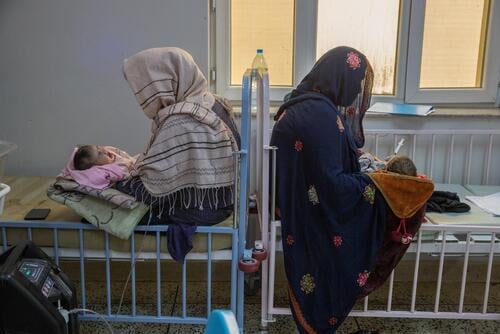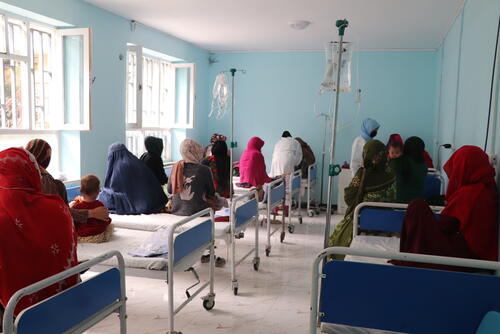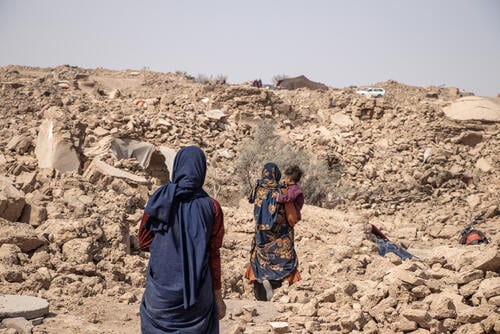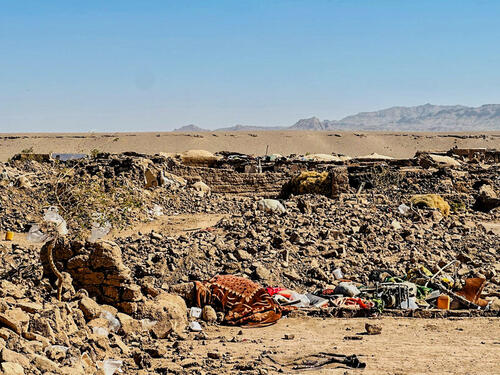“I really don’t know the pain she’s going through, but I am here with her hoping she gets better soon,” says Farida, the mother of nine-month-old Hadia.
For two days, Hadia has refused to eat anything, even her favourite fruit, bananas. Her mother took her to several health facilities and doctors, but her condition never seemed to improve. Desperate to see her baby get well, Farida took Hadia wherever anyone suggested.
“Anything people said, I tried. I took her to many doctors and paid a lot for her prescriptions, but she did not get better, and she even developed diarrhoea, which got worse,” Farida says.
Today, she is seated at the paediatric emergency room of Mazar-i-Sharif Referral Hospital in Balkh Province, Afghanistan, which Médecins Sans Frontières (MSF) supports.
Little Hadia has been diagnosed with severe acute malnutrition. The doctors say it may have been caused by the bouts of diarrhoea, among other possible reasons. Farida is hopeful that her child will get better.
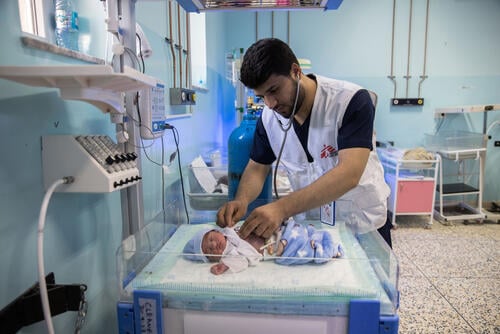
One floor above the emergency room, *Shekiba holds her baby, *Atoosa, in the prematurity ward, where they have been for the last two days after being discharged from the neonatal intensive care unit (NICU)The NICU is a dedicated area equipped with specialised medical equipment and medical staff trained to provide care to very sick and premature babies in need of intensive care. The care provided in the NICU is tailored to the unique needs of newborns, often including support for preterm babies, those with low birthweight, perinatal problems or congenital abnormalities..
For four weeks, Atoosa had been in an incubator at the NICU, having been born at 28 weeks — three months earlier than her due date — weighing only 1.2 kilogrammes.
“It was difficult for me to see my little girl inside an incubator, lines running into her nose and wires connected to many parts of her body. I hated the sounds made from the constant beeps of the medical equipment as they kept reminding me that my baby was very sick,” Shekiba says.
“She looked so fragile. The anguish of not knowing if my little girl would get better was as though something was chewing on my insides,” she says.
“I remember the day the doctors told me that my little girl would be transferred from intensive care to the prematurity ward because she was stable. I couldn't believe it. I immediately called my husband and told him to prepare everything because the time to return home was getting closer.”
The anguish of not knowing if my little girl would get better was as though something was chewing on my insides.Shekiba, mother of Atoosa, who was born three months premature
In August 2023, MSF launched medical services at Mazar-i-Sharif Regional Hospital in Balkh Province in collaboration with the Ministry of Public Health, aiming to reduce paediatric and neonatal mortality rates in the northern provinces. We currently run a NICU and emergency room (ER) for children up to the age of 15, supported by a triage system to ensure the most critical patients are admitted and given the care they need.
Our medical teams at Mazar-i-Sharif Regional Hospital admit an average of 3,000 critically ill children in the paediatric ER and an average of 546 newborns to the NICU each month. The average bed occupancy rate has consistently been higher than 140 per cent since we started activities in the NICU.
It currently accommodates 60 infants, more than double its 27-bed capacity. We have had to put in place additional resources to ensure that staff can continue to provide personalised care and attention to each infant and reduce the risk of burnout despite the capacity needs and limited space.
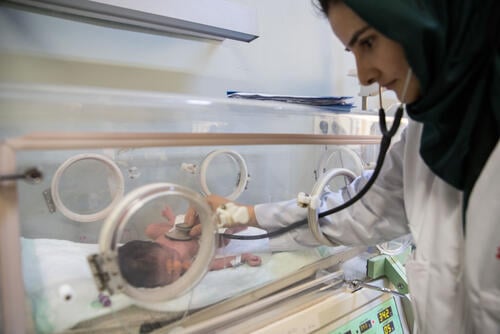
“We intervened in Mazar-i-Sharif to address the critical healthcare needs of the Afghan people, particularly vulnerable infants and children, in the face of overwhelming demand, strained healthcare systems, and a shortage of resources,” says Heidi Hochstenbach, says MSF’s head of programmes in Mazar-i-Sharif.
Our goal is to ensure that every child who comes to the hospital receives the personalised care and support they need and to reduce the number of children dying from conditions that can be treated,” she says.
“The high bed occupancy rates we see in the departments we support reflect the huge need for such services and the deep gaps in the provision of healthcare in the province.”
I dream of the moments I will have with my little girl. To comb her hair, make beautiful braids, play with her and take her to school.Shekiba, mother of Atoosa, who was born three months premature
Afghanistan's healthcare system has long been challenged by issues such as understaffing, underfunding, and an inadequate response to the needs of the people. The healthcare system has faced additional strain since the change in government in August 2021 and the subsequent reduction in donor funding.
This has resulted in the deterioration of health infrastructure, a further shortage of healthcare workers, leaving many without access to healthcare and increasing the risk of poor health conditions and mortality among people.
The experiences of Farida and Shekiba highlight the needs and crucial gaps in access to healthcare that MSF seeks to fill with specialised care and support at Mazar-i-Sharif Regional Hospital.
“I dream of the moments I will have with my little girl. To comb her hair, make beautiful braids, play with her and take her to school,” Shekiba says.
*Names changed to protect identity.
MSF started working in Afghanistan in 1980. We have continually adjusted our services to align with the evolving context and the needs of people. The initiation of services in Balkh Province adds to seven existing projects that we currently manage in the country.



